*NURSING > EXAM REVIEW > Chapter 18: Eating and Feeding Disorders Halter: Varcarolis’ Foundations of Psychiatric Mental Hea (All)
Chapter 18: Eating and Feeding Disorders Halter: Varcarolis’ Foundations of Psychiatric Mental Health Nursing: A Clinical Approach, 8th Edition(GRADED A)
Document Content and Description Below
Over the past year, a woman has cooked gourmet meals for her family but eats only tiny servings. This person wears layered loose clothing. Her current weight is 95 pounds, a loss of 35 pounds. Which... medical diagnosis is most likely? a. Binge eating b. Bulimia nervosa c. Anorexia nervosa d. Eating disorder not otherwise specified ANS: C Overly controlled eating behaviors, extreme weight loss, preoccupation with food, and wearing several layers of loose clothing to appear larger are part of the clinical picture of an individual with anorexia nervosa. The individual with bulimia usually is near normal weight. The binge eater is often overweight. The patient with eating disorder not otherwise specified may be obese. PTS: 1 DIF: Cognitive Level: Understand (Comprehension) REF: Page 18-67 (Box 18-1) TOP: Nursing Process: Assessment MSC: Client Needs: Physiological Integrity 2. Disturbed body image is a nursing diagnosis established for a patient diagnosed with an eating disorder. Which outcome indicator is most appropriate to monitor? a. Weight, muscle, and fat congruence with height, frame, age, and sex b. Calorie intake is within required parameters of treatment plan c. Weight reaches established normal range for the patient d. Patient expresses satisfaction with body appearance ANS: D Body image disturbances are considered improved or resolved when the patient is consistently satisfied with his or her own appearance and body function. This is a subjective consideration. The other indicators are more objective but less related to the nursing diagnosis. PTS: 1 DIF: Cognitive Level: Apply (Application) REF: Pages 18-13, 58 (Table 18-3) TOP: Nursing Process: Outcomes Identification MSC: Client Needs: Psychosocial Integrity 3. A patient referred to the eating disorders clinic has lost 35 pounds during the past 3 months. To assess eating patterns, the nurse should ask the patient: a. ―Do you often feel fat?‖ b. ―Who plans the family meals?‖ c. ―What do you eat in a typical day?‖ d. ―What do you think about your present weight?‖ testbanks_and_xanax ANS: C Although all the questions might be appropriate to ask, only ―What do you eat in a typical day?‖ focuses on the eating patterns. Asking if the patient often feels fat focuses on distortions in body image. Questions about family meal planning are unrelated to eating patterns. Asking for the patient‘s thoughts on present weight explores the patient‘s feelings about weight. PTS: 1 DIF: Cognitive Level: Apply (Application) REF: Pages 18-12, 19 (Case Study and Nursing Care Plan) TOP: Nursing Process: Assessment MSC: Client Needs: Physiological Integrity 4. A patient diagnosed with anorexia nervosa virtually stopped eating 5 months ago and lost 25% of body weight. A nurse asks, ―Describe what you think about your present weight and how you look.‖ Which response by the patient is most consistent with the diagnosis? a. ―I am fat and ugly.‖ b. ―What I think about myself is my business.‖ c. ―I‘m grossly underweight, but that‘s what I want.‖ d. ―I‘m a few pounds‘ overweight, but I can live with it.‖ ANS: A Untreated patients with anorexia nervosa do not recognize their thinness. They perceive themselves to be overweight and unattractive. The patient with anorexia will usually tell people perceptions of self. The patient with anorexia does not recognize his or her thinness and will persist in trying to lose more weight. PTS: 1 DIF: Cognitive Level: Apply (Application) REF: Pages 18-12, 19 (Case Study and Nursing Care Plan) TOP: Nursing Process: Assessment MSC: Client Needs: Psychosocial Integrity 5. A patient was diagnosed with anorexia nervosa. The history shows the patient virtually stopped eating 5 months ago and lost 25% of body weight. The serum potassium is currently 2.7 mg/dL. Which nursing diagnosis applies? a. Adult failure to thrive related to abuse of laxatives as evidenced by electrolyte imbalances and weight loss b. Disturbed energy field related to physical exertion in excess of energy produced through caloric intake as evidenced by weight loss and hyperkalemia c. Ineffective health maintenance related to self-induced vomiting as evidenced by swollen parotid glands and hyperkalemia d. Imbalanced nutrition: less than body requirements related to reduced oral intake as evidenced by loss of 25% of body weight and hypokalemia ANS: D The patient‘s history and lab result support the nursing diagnosis Imbalanced nutrition: less than body requirements. Data are not present that the patient uses laxatives, induces vomiting, or exercises excessively. The patient has hypokalemia rather than hyperkalemia. PTS: 1 DIF: Cognitive Level: Analyze (Analysis) testbanks_and_xanax REF: Pages 18-12, 13, 19 (Case Study and Nursing Care Plan) TOP: Nursing Process: Analysis/Diagnosis MSC: Client Needs: Physiological Integrity 6. Outpatient treatment is planned for a patient diagnosed with anorexia nervosa. Select the most important desired outcome related to the nursing diagnosis Imbalanced nutrition: less than body requirements. Within 1 week, the patient will a. weigh self accurately using balanced scales. b. limit exercise to less than 2 hours daily. c. select clothing that fits properly. d. gain 1 to 2 pounds. ANS: D Only the outcome of a gain of 1 to 2 pounds can be accomplished within 1 week when the patient is an outpatient. The focus of an outcome would not be on the patient weighing self. Limiting exercise and selecting proper clothing are important, but weight gain takes priority. PTS: 1 DIF: Cognitive Level: Apply (Application) REF: Pages 18-13, 19 (Case Study and Nursing Care Plan), 58 (Table 18-3) TOP: Nursing Process: Outcomes Identification MSC: Client Needs: Physiological Integrity 7. Which nursing intervention has the highest priority as a patient diagnosed with anorexia nervosa begins to gain weight? a. Assess for depression and anxiety. b. Observe for adverse effects of refeeding. c. Communicate empathy for the patient‘s feelings. d. Help the patient balance energy expenditures with caloric intake. ANS: B The nursing intervention of observing for adverse effects of refeeding most directly relates to weight gain and is a priority. Assessing for depression and anxiety, as well as communicating empathy, relates to coping. Helping the patient achieve balance between energy expenditure and caloric intake is an inappropriate intervention. PTS: 1 DIF: Cognitive Level: Apply (Application) REF: Pages 18-14, 54 (Table 18-1) TOP: Nursing Process: Implementation MSC: Client Needs: Physiological Integrity 8. A patient diagnosed with anorexia nervosa is resistant to weight gain. What is the rationale for establishing a contract with the patient to participate in measures designed to produce a specified weekly weight gain? a. Because severe anxiety concerning eating is expected, objective and subjective data may be unreliable. b. Patient involvement in decision making increases sense of control and promotes adherence to the plan of care. testbanks_and_xanax c. Because of increased risk of physical problems with refeeding, the patient‘s permission is needed. d. A team approach to planning the diet ensures that physical and emotional needs will be met. ANS: B A sense of control for the patient is vital to the success of therapy. A diet that controls weight gain can allay patient fears of too-rapid weight gain. Data collection is not the reason for contracting. A team approach is wise but is not a guarantee that needs will be met. Permission for treatment is a separate issue. The contract for weight gain is an additional aspect of treatment. PTS: 1 DIF: Cognitive Level: Apply (Application) REF: Pages 18-19 (Case Study and Nursing Care Plan), 58 (Table 18-3) TOP: Nursing Process: Planning MSC: Client Needs: Psychosocial Integrity 9. The nursing care plan for a patient diagnosed with anorexia nervosa includes the intervention ―monitor for complications of refeeding.‖ Which system should a nurse closely monitor for dysfunction? a. Renal b. Endocrine c. Integumentary d. Cardiovascular ANS: D Refeeding resulting in too-rapid weight gain can overwhelm the heart, resulting in cardiovascular collapse. Focused assessment is a necessity to ensure the patient‘s physiological integrity. The other body systems are not initially involved in the refeeding syndrome. PTS: 1 DIF: Cognitive Level: Apply (Application) REF: Pages 18-14, 54 (Table 18-1) TOP: Nursing Process: Assessment MSC: Client Needs: Physiological Integrity 10. A psychiatric clinical nurse specialist uses cognitive-behavioral therapy for a patient diagnosed with anorexia nervosa. Which statement by the staff nurse supports this type of therapy? a. ―What are your feelings about not eating foods that you prepare?‖ b. ―You seem to feel much better about yourself when you eat something.‖ c. ―It must be difficult to talk about private matters to someone you just met.‖ d. ―Being thin doesn‘t seem to solve your problems. You are thin now but still unhappy.‖ ANS: D The correct response is the only strategy that questions the patient‘s distorted thinking. PTS: 1 DIF: Cognitive Level: Apply (Application) REF: Pages 18-19 (Case Study and Nursing Care Plan), 29, 30 TOP: Nursing Process: Implementation MSC: Client Needs: Psychosocial Integrity [Show More]
Last updated: 1 year ago
Preview 1 out of 12 pages
.png)
Reviews( 0 )
Document information
Connected school, study & course
About the document
Uploaded On
May 04, 2021
Number of pages
12
Written in
Additional information
This document has been written for:
Uploaded
May 04, 2021
Downloads
0
Views
114
.png)

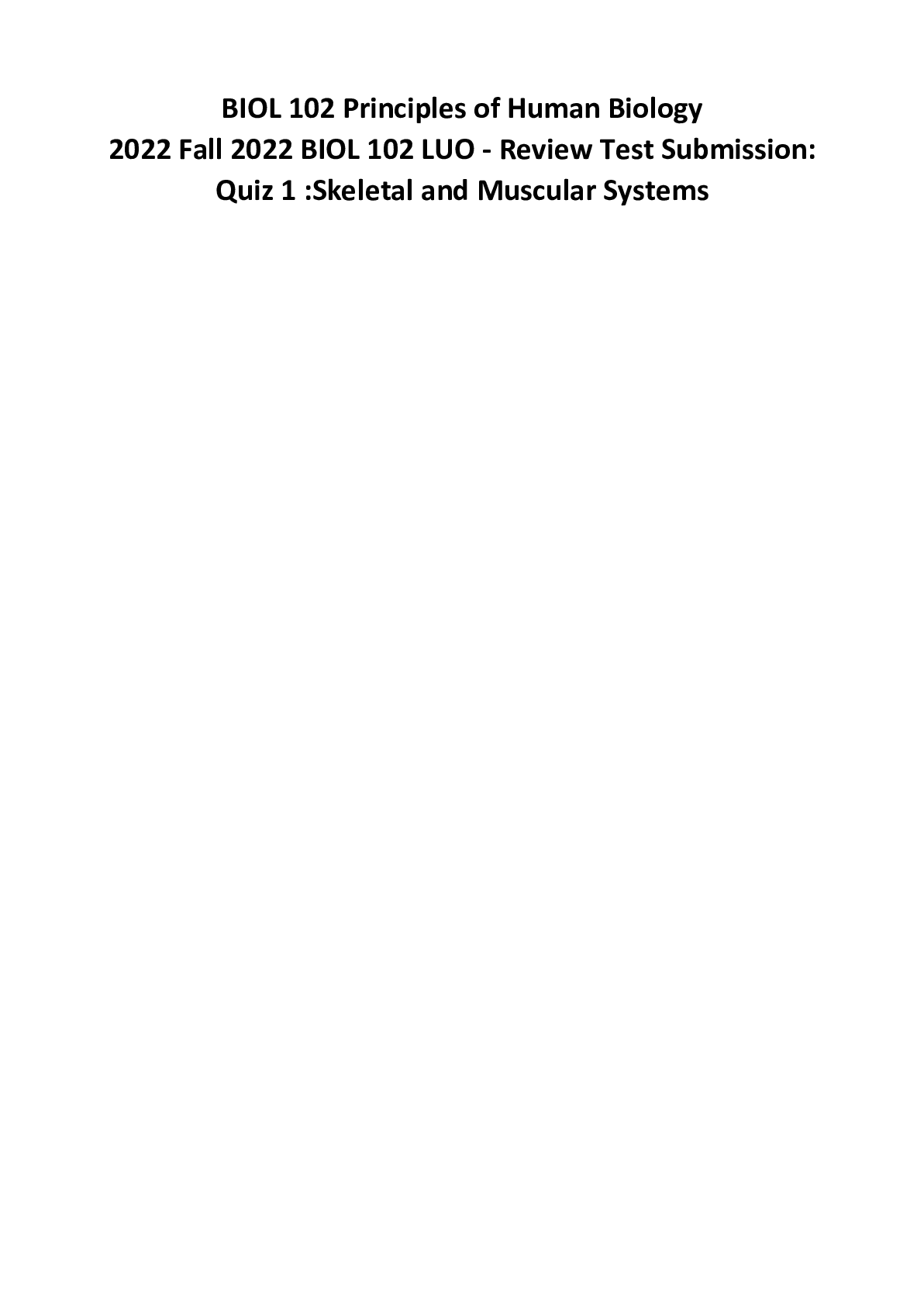
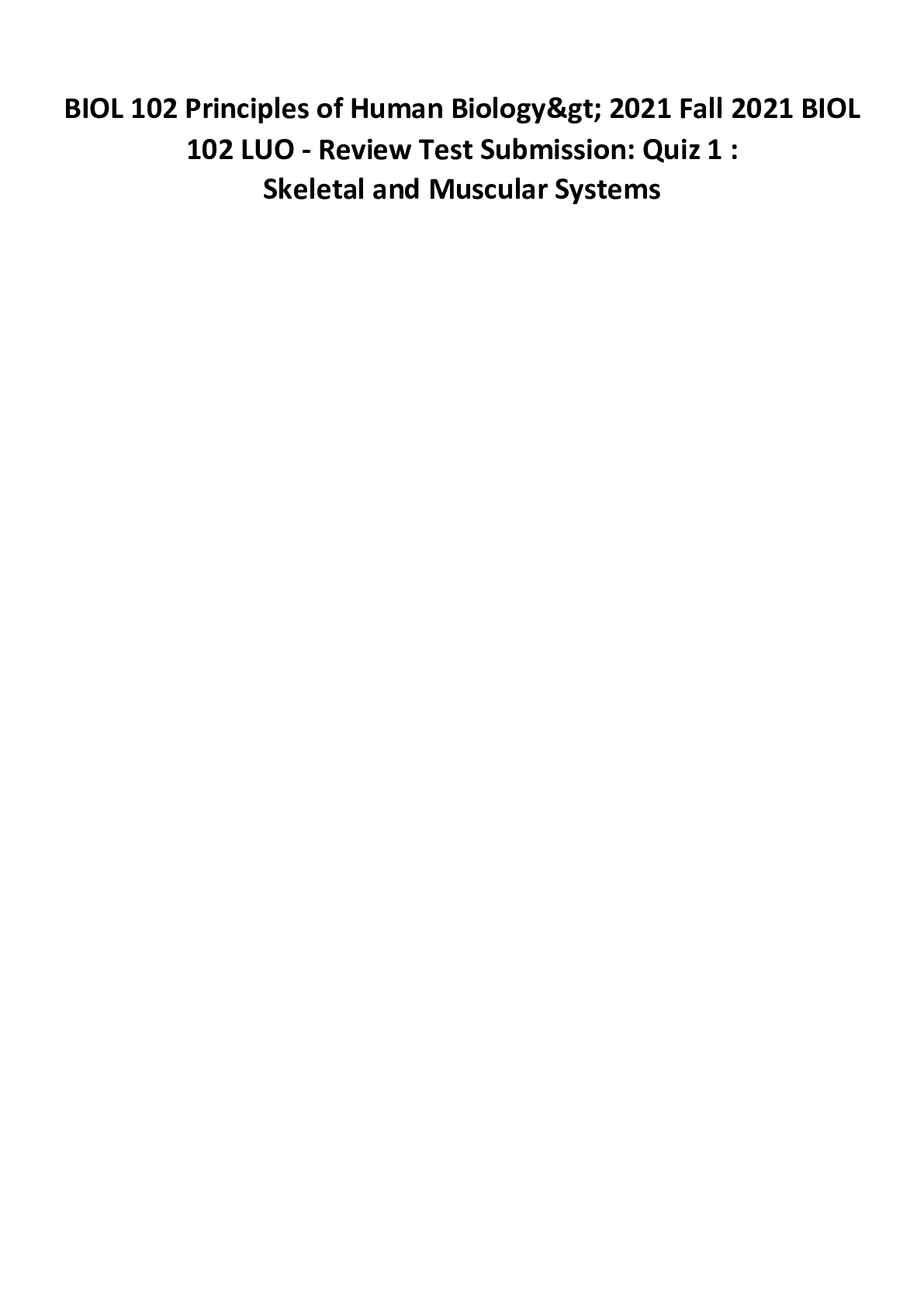
.png)

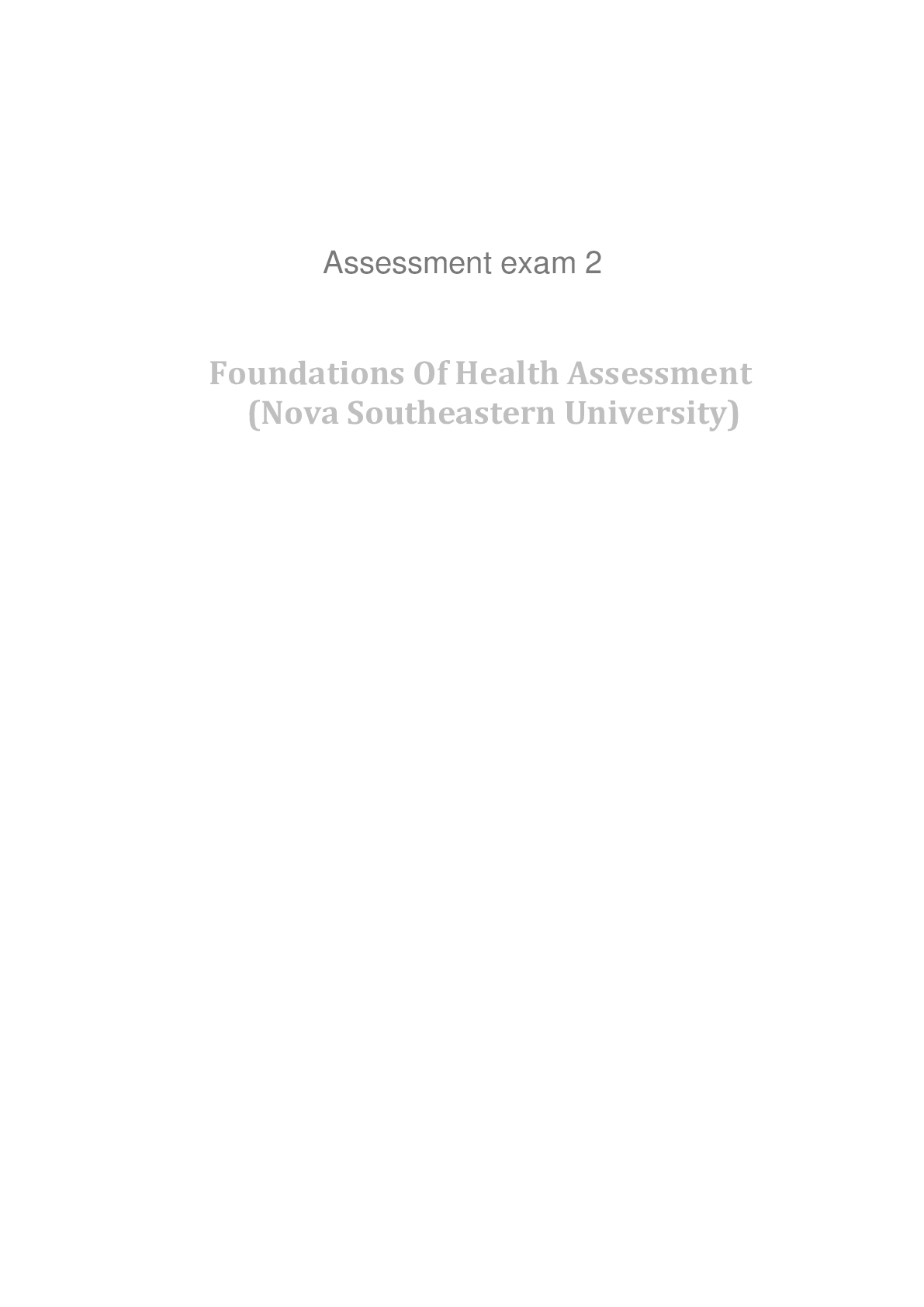
.png)
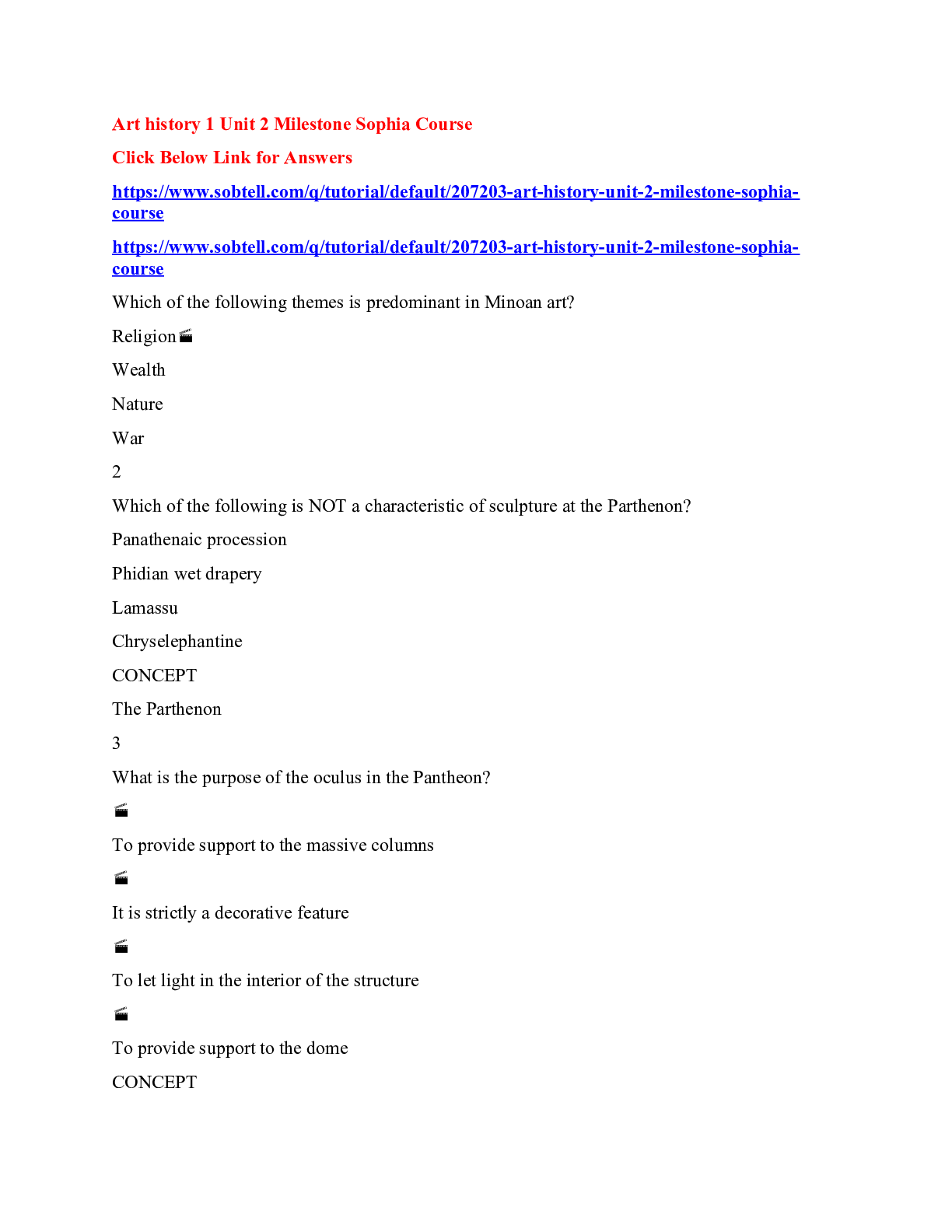
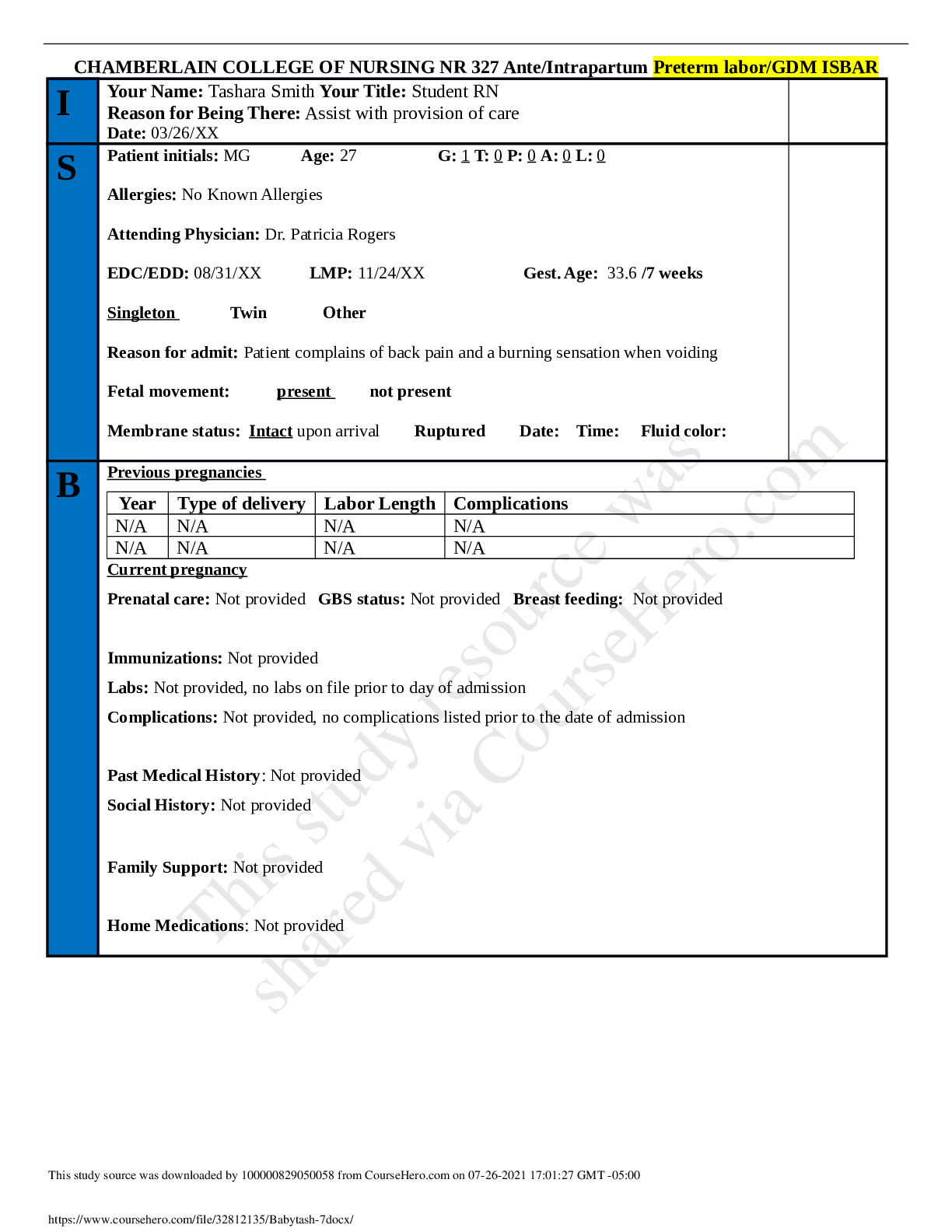
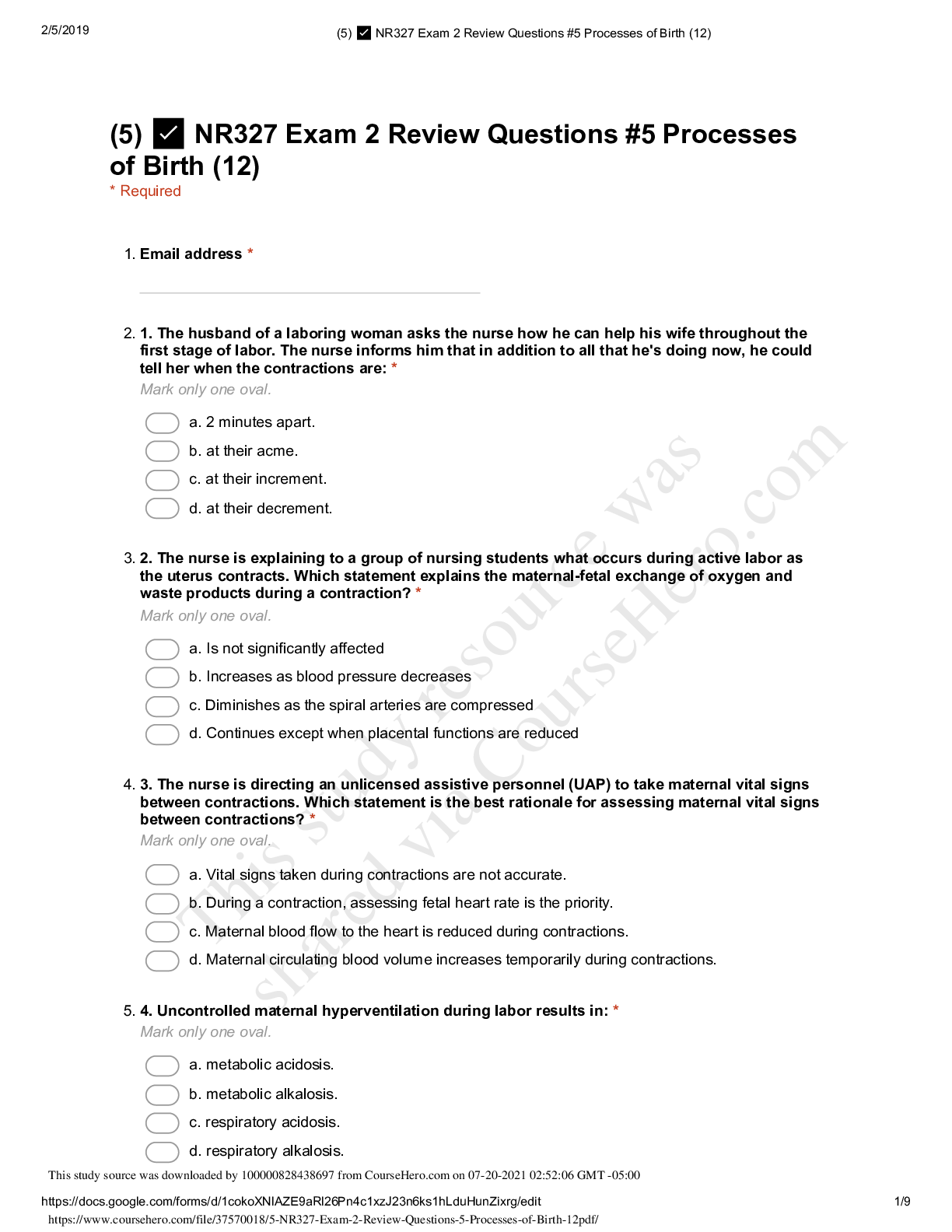
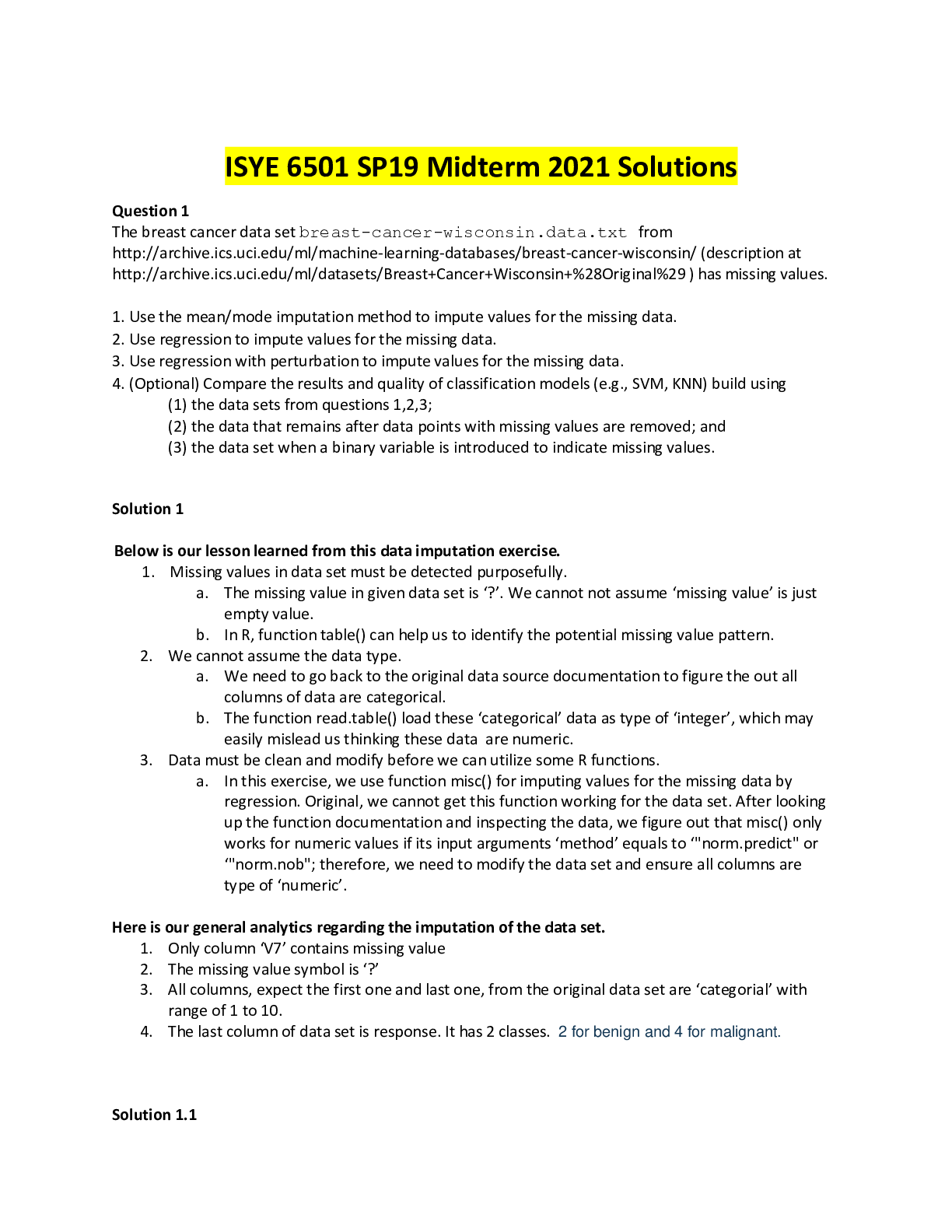
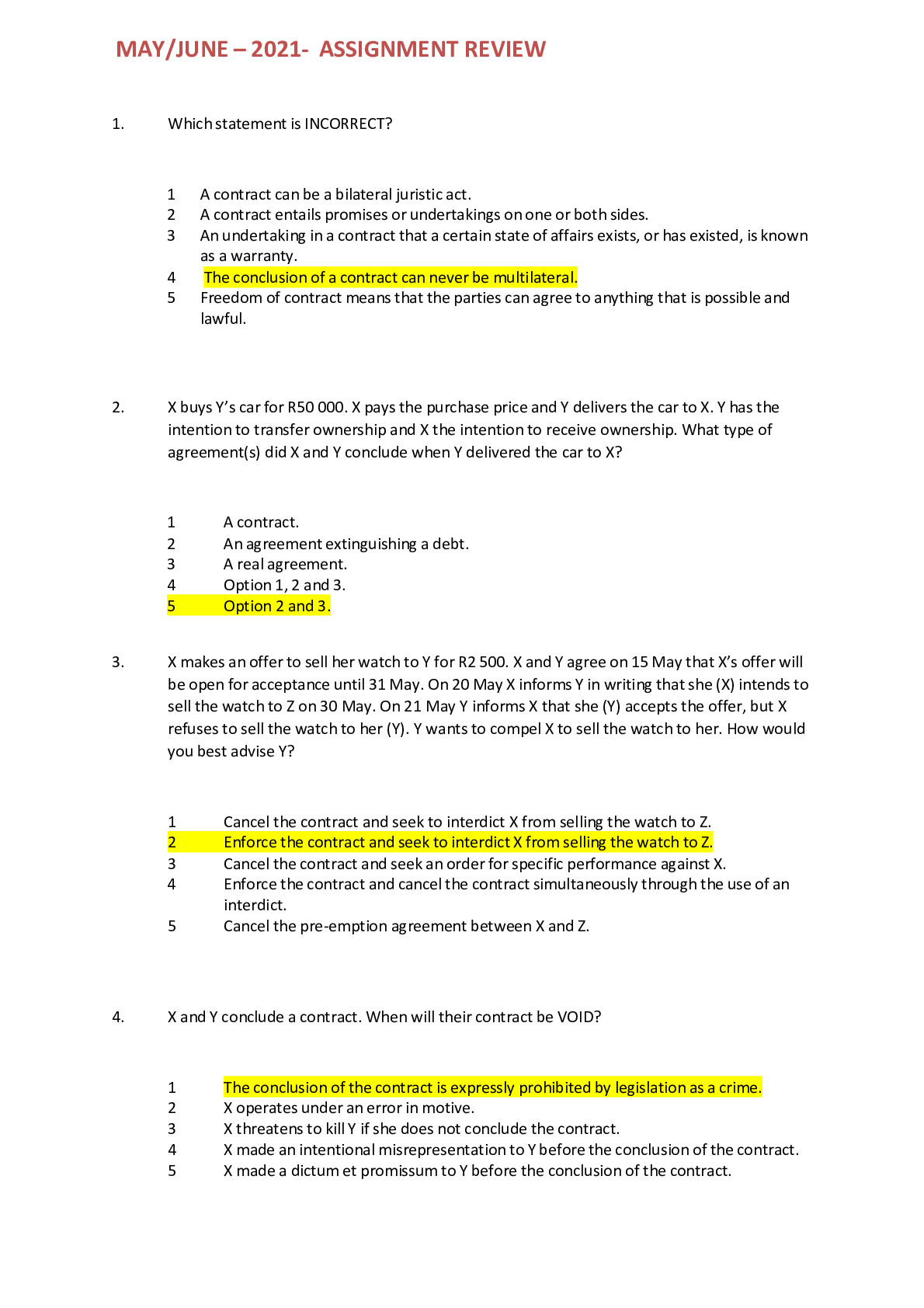
.png)
.png)
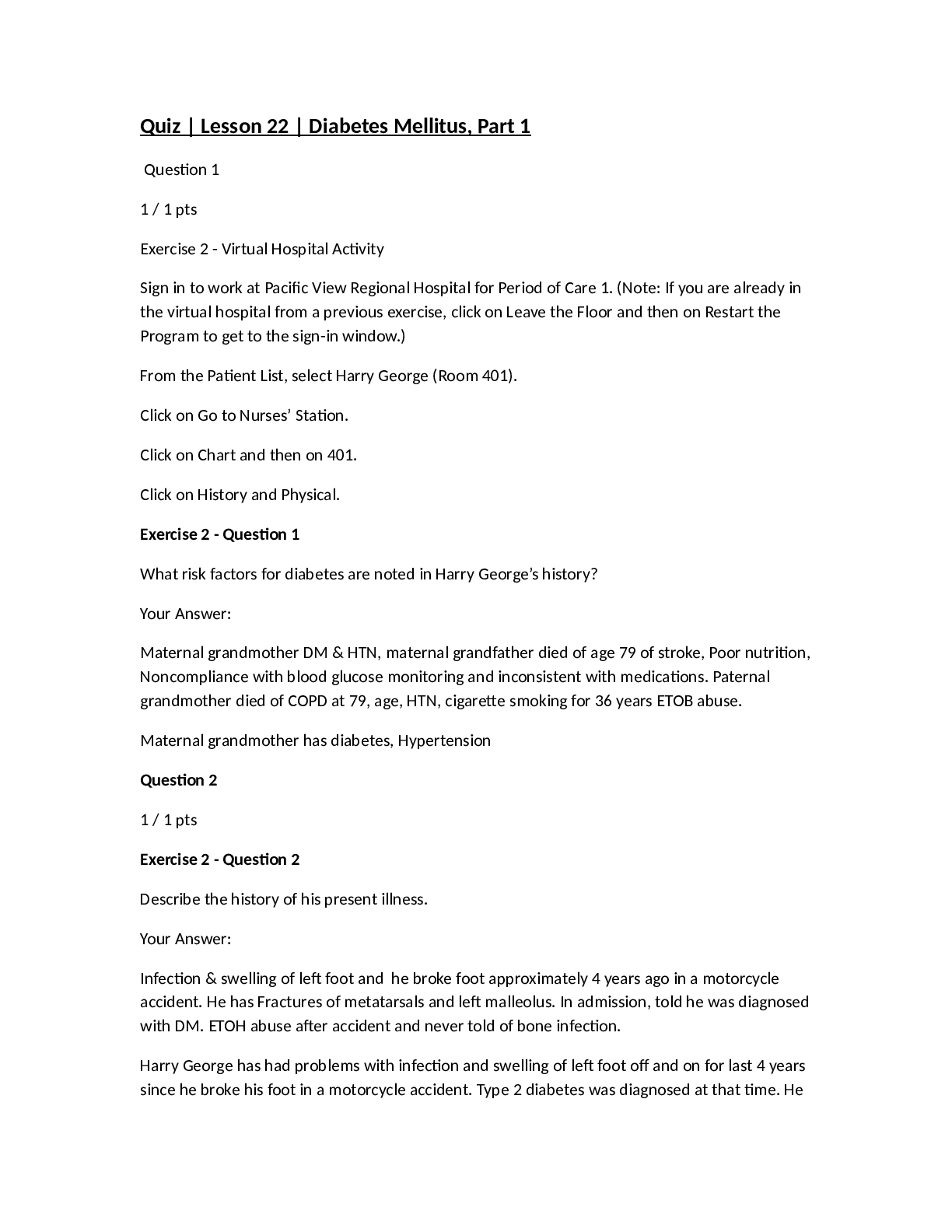
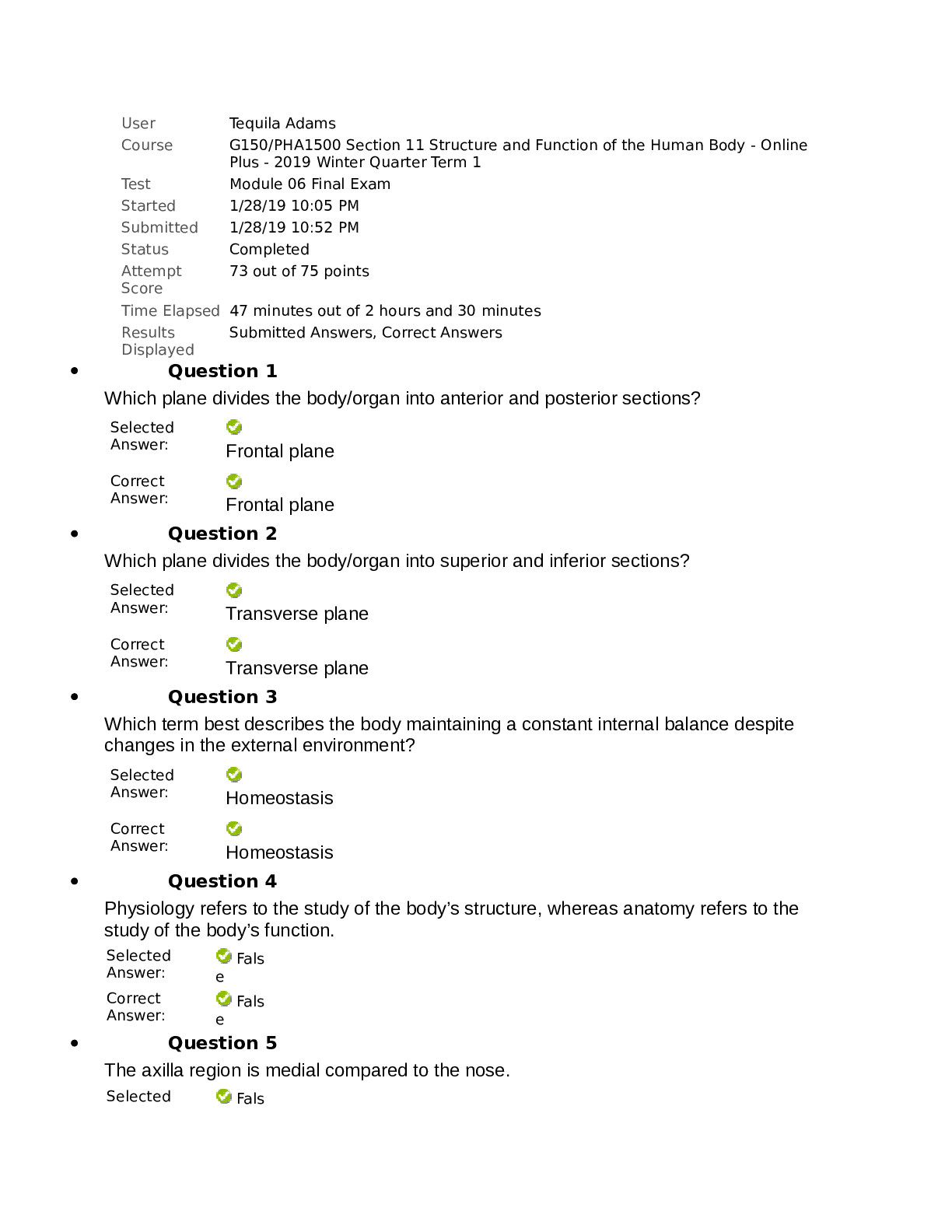
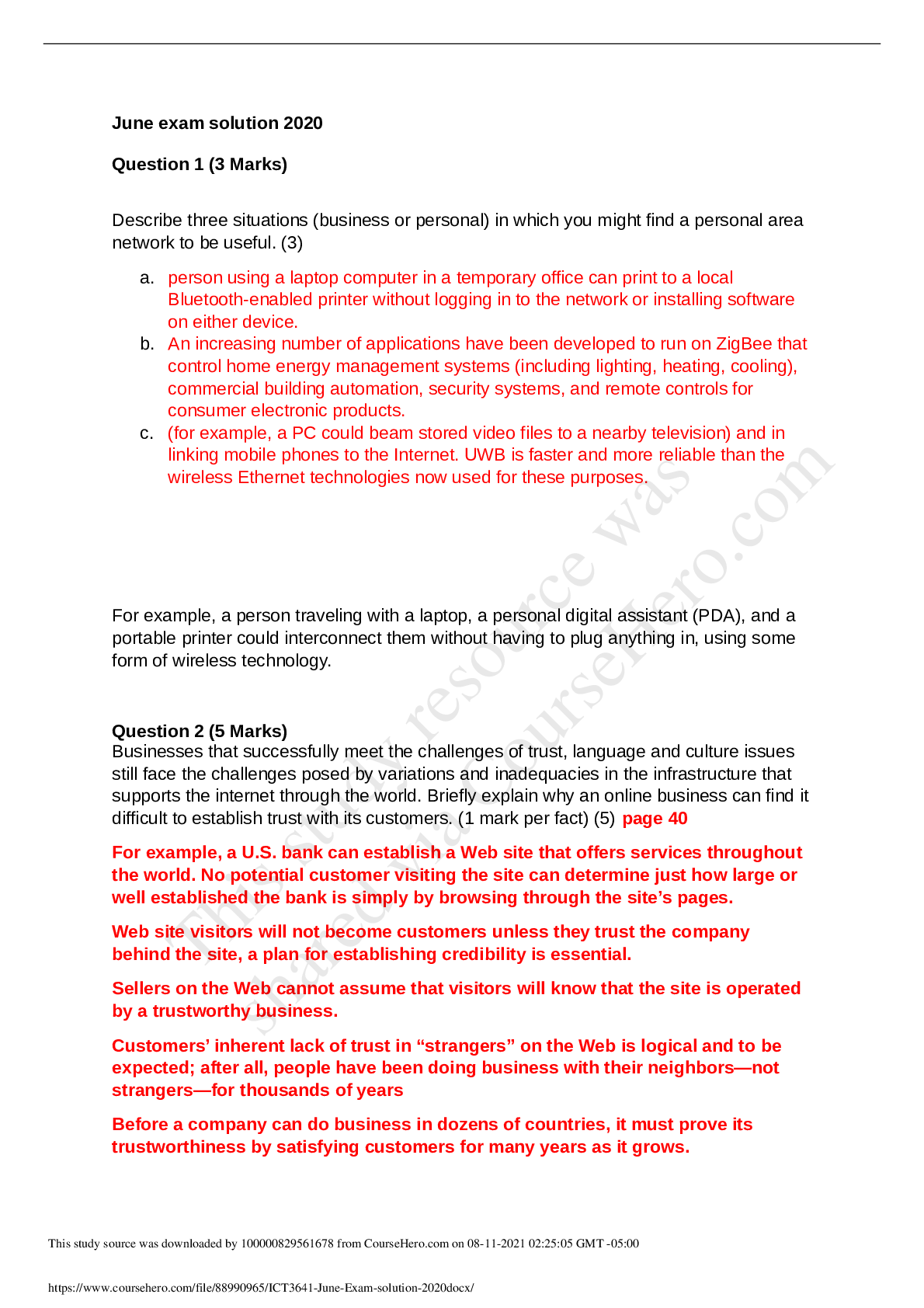
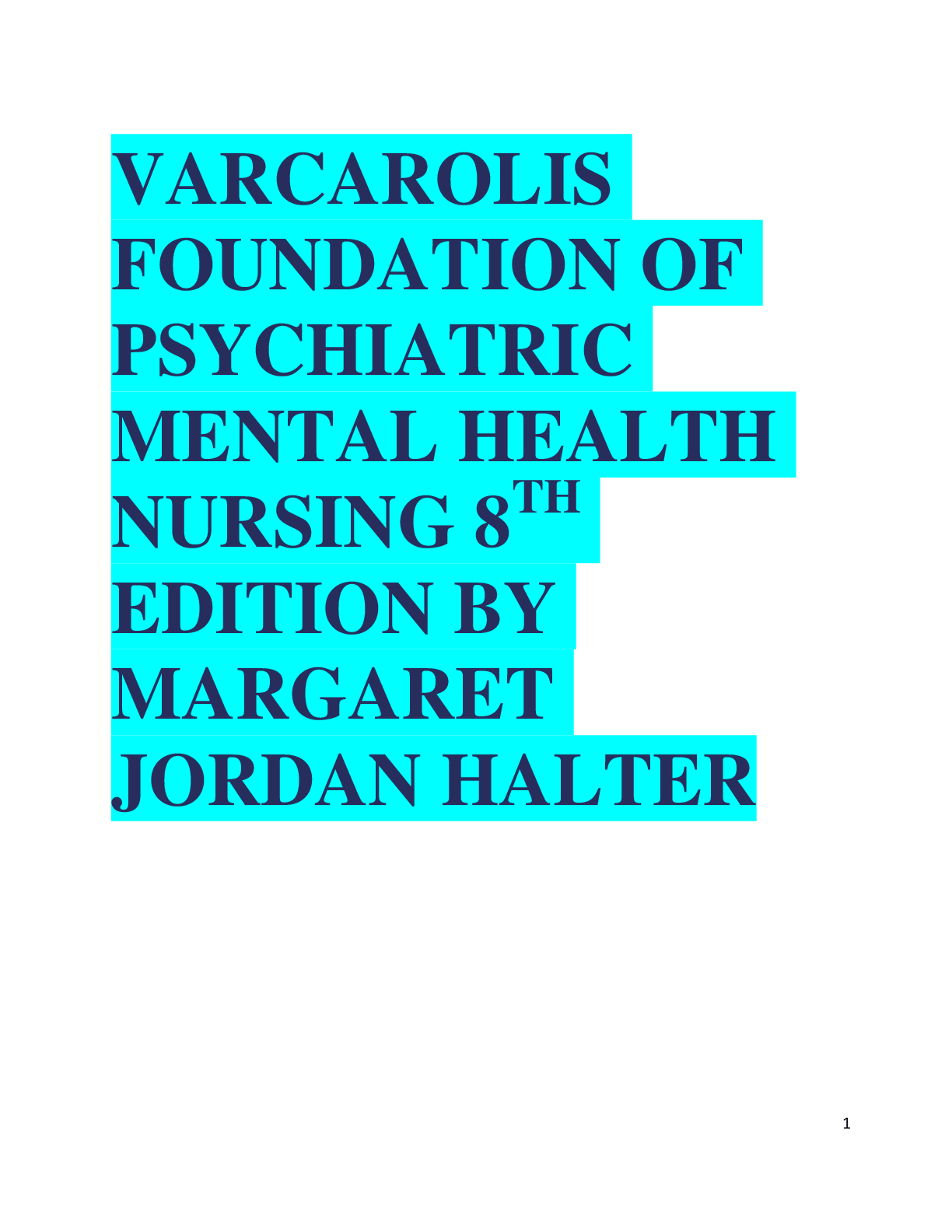
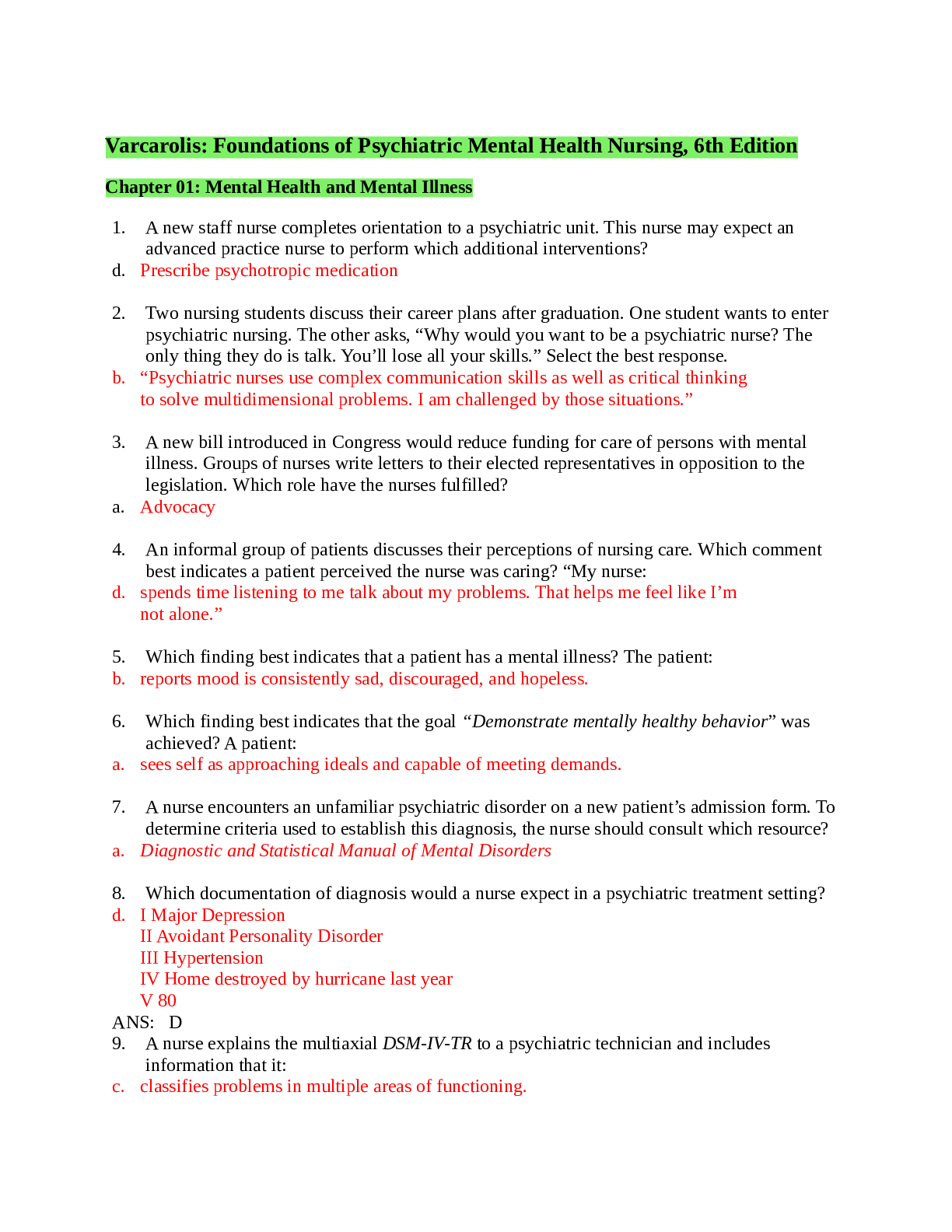
.png)
.png)
.png)
.png)
.png)
.png)
.png)
.png)
.png)
.png)
.png)
.png)
.png)
.png)
.png)
.png)

